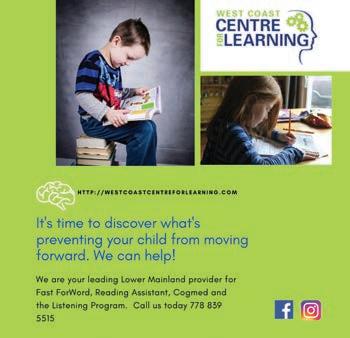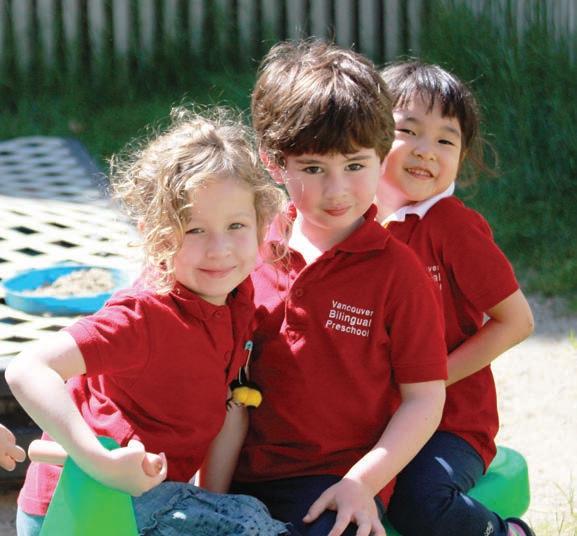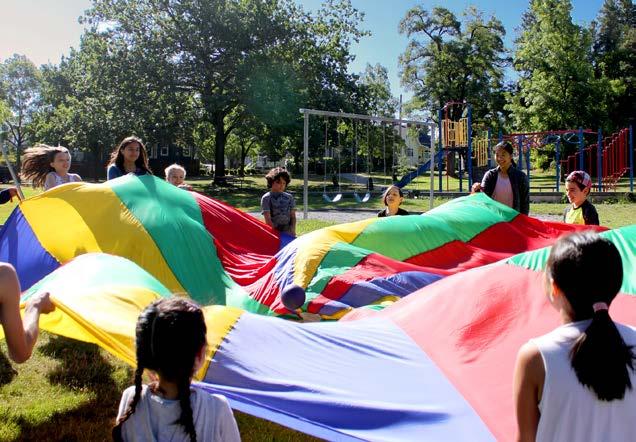
8 minute read
Dig This: 10 Big Benefits of Gardening with Kids
DIG THIS: 10 Big Benefits of
Gardening with Kids
Advertisement
By Janeen Lewis
Most parents want their children to get outside away from phones, TV and video games, and gardening is a great way to achieve this goal. However, recent research shows that there are several other reasons to start a garden with kids. The benefits range from making kids smarter to making them healthier. Here are 10 great reasons to get kids gardening:
1. Students who garden score higher on science tests. Gardening is full of science. Children learn about plant classification, weather, soil, and plant pests and disease. They are introduced to botany in a natural, hands-on way, and recent research shows that students who had gardening experiences as part of their school curriculum did better on standardized science tests than students who were not exposed to gardening in school.
2. If they grow it, they will eat it. As a teacher, I’ve taught STEM (Science, Technology, Engineering and Math) and have served as a Junior Master Garden club leader. In these roles I witnessed the “if they grow it, they will eat it” phenomenon. Students love to dig up what they have grown, and then curiosity gets the better of them – they want to taste it.
Master Gardener Beth Tovi volunteered to mentor students in the garden for eight years at the elementary school where she served as a media specialist. She sees the nutritional and health benefits children gain from gardening. “With the growing concerns about obesity, diabetes, and even high blood pressure in children, gardening gets them physically active and outdoors. And children will eat anything they grow – even if it’s green.” 3. Digging in the dirt can make kids healthier. Several studies show that children who were raised on farms don’t have as many respiratory allergies, asthma, or autoimmune disorders as children who were raised in urban areas because children who live on farms are exposed to more microbes and fungi in the dirt. Letting children get outside and get in the dirt may actually make them healthier than keeping them tidy, clean and inside.
4. Gardening strengthens emotional and interpersonal skills. Children who garden learn responsibility, patience, perseverance and how to deal with disappointment if the garden doesn’t grow the way they expected. How do they collaborate with other siblings, friends, or school mates to get the garden work done? These are character-building skills that research shows children reap in the garden.
I witnessed this one year at a school garden when we had a drought. Watering the plants and trying to keep them healthy was an arduous task, and the students and I learned about perseverance and team work.
5. Gardening connects children with nature. When children garden, they gain ownership in what they are cultivating. I have seen my own children grow “attached” to the plants in the containers on our patio garden. As children become more knowledgeable about all the living things in the garden, they are less likely to be afraid of touching the plants, getting soil on their hands or being near bugs. They are no longer afraid of the unknown when they become familiar with what is in the garden.
6. Gardening helps relieve stress for the whole family. A garden can be therapeutic. Not that your fourth grader is battling traffic, raising children and feeling the demands of a pressureridden job, but even kids can feel stress, and the garden is good for eliminating it. In fact, a study in the Netherlands showed that after 30 minutes of gardening, subjects who had shown stress before they gardened had a “fully restored” positive mood. And if the adults in the family are feeling stressed, and they garden with their children, it can help the whole family feel more harmonious.
7. Gardening teaches kids to problem-solve. “When they garden, children learn problemsolving skills,” Tovi says. “They say ‘This trellis doesn’t work very well. How can we make one that will better support this kind of plant?’”
In a garden, children ask questions like “What is eating this plant?” or “Is this tree dying?” Once children become absorbed in solving the problems in a garden, they want to research to find the best answers.
“They become sleuths, starting in the garden and heading into the computers,” Tovi says.
8. Gardening is a good work out. Gardening is good physical labor involving muscles that don’t always get a workout. Even the most seasoned gym-goer may admit to being sore the day after working in a garden. Gardening involves stretching, bending, digging, lifting, pulling and raking. Gross and fine motor skills are used, and even the youngest gardener with simple tasks gets physical activity.

9. Gardening helps children become environmental stewards. When children start reaping the food and flowers that come from a garden, they realize a garden’s impact on them and their impact on the garden. Once they have this tangible experience, it is much easier to teach them to care for the environment.
10. Gardening can lead to a longer life. Studies show that adults who garden in their later years live longer. Instead of living a sedentary life, gardeners get off the couch and are active in nature. Teaching children good habits when they are young will make them more likely to follow them through life.
Sow the seeds of a garden with your child today, and see them reap the benefits for a lifetime.
Janeen Lewis is a freelance journalist and mother of two. She loves to teach gardening to children.
No Yard? No Problem! When your backyard is a concrete patio or an apartment balcony, it’s hard to imagine growing a bountiful garden. But it can be done in containers. Choose some eco-friendly containers with drainage holes in the bottom, fill them with a potting mix and then choose seeds or seedlings to plant.
Another option is to grow an herb garden inside on a sunny window ledge. A great resource for starting a container garden is The Vegetable Gardener’s Container Bible: How to Grow a Bounty of Food in Pots, Tubs, and Other Containers by Edward C. Smith. This book teaches even beginning gardeners how to grow organic food in small spaces. The book covers container and tool selection, caring for plants and controlling pests without chemicals. With a little research and tender care, you can grow flowers and vegetables that flourish.
Creative Theme Gardens to Grow with Kids These interesting themes are a great way inspire children to garden. • Pizza Garden: Grow all the herbs to add to a pizza. For an extra touch, make the garden round like a pizza. • Fairy Garden: Includes both plants and miniature structures and is a great place for your child’s imagination to grow. • Pollinator Garden: Build a garden that attracts butterflies, bees, birds, bats and other insects and animals that will help pollinate plants. Try planting milkweed, zinnias and snapdragons. • Herb Garden: Herb gardens are a great way to foray into the world of gardening. They can be grown inside or outside and include plants such as basil, oregano, sage, thyme, parsley and many more. • Art Garden: Students can grow flowers and plants that can be used to make art, or grow a garden of plants to sketch. • Maze Garden: Create a maze with hedges, grasses or corn. In the middle of the maze, put something interesting like a sculpture, fountain, or another special garden bed. • Peter Rabbit Garden: Grow the vegetables found in Mr. McGregor’s garden. The great thing about this garden is that you can grow some of the vegetables – carrots, lettuce, radishes and cabbage – in cool weather, so you could continue to garden into fall. • Salsa Garden: Grow tomatoes, peppers, and onions to make a delicious salsa. • WildflowerGarden: Visit a nature preserve to discover the native wildflower plants in your area, then grow your own. • Three Sister’s Garden: Teach children about plants that grow well together, like corn, beans, and squash by cultivating the three in one mound.

Tender, loving chiropractic care for your loved ones
Call us for a free consultation to find out if we can help with your family’s health care needs. Vancouver’s Pediatric & Family Wellness Chiropractor www.FamilyWellnessChiro.ca

Busy life?

Have BC Parent delivered to your inbox. Visit www.bcparent.ca to subscribe.
POSITIVE CHANGE STARTS THIS SUMMER!
G I V E Y O U R C H I L D T H E G I F T O F A S E C O N D L A N G U A G E

The ability to learn languages is highest between birth and age 6. Our French-English preschool program maximizes a child’s natural curiosity and ability to learn a second language during this important window of opportunity. • Established in 1962 • Caring, experienced & highly qualified bilingual teachers • Bright, extra-spacious classrooms • Private indoor & outdoor play areas • Introduction to French, reading, math, science and nature, music, crafts • Educational field trips
VANCOUVER BILINGUAL PRESCHOOL 949 West 49th Avenue (at Oak St.) Vancouver, BC V5Z 2T1 Phone/Fax: 604.261.1221
vancouverbilingual@yahoo.ca • www.vancouverbilingual.com
LOVE OF SUMMER starts here
When our school year ends, Westside Montessori Academy opens its doors for a summer of exploration, adventure and fun!
Is a learning disability affecting your work or education goals? From age 10 to adult, Eaton Arrowsmith, Vancouver and White Rock, can help you unlock your brain’s potential!

The Arrowsmith Summer Cognitive Intensive Program July 6 - August 14 Monday to Friday 9am to 3pm Email: admissions@eatonarrowsmith.com Phone: 604.264.8327 www.eatonarrowsmith.com

WMA SUMMER CAMP
July 6-31 Contact us: 604-434-9611 3075 Slocan St. Vancouver at the Italian Cultural Centre on Grandview REGISTER FOR INFORMATION www.WestsideMontessoriAcademy.ca
Love of Learning starts here










